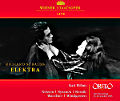ORFEO International – Catalogue
CDs
Richard Strauss - Elektra
Following on from the success of the scandalous Salome, it was with Elektra in 1909 – his first collaboration with Hugo von Hofmannsthal – that Richard Strauss finally cemented his position as the leading German opera composer of his generation. Even today, the radical expressive violence of Elektra is regarded as paradigmatic of musical Modernism. The immense vocal and orchestral demands it makes remain undiminished, too. The number of singers who have really been able to meet the murderous challenge of singing the title role have been few and far between. 
C 886 142 IIn the 1960s and ’70s, Birgit Nilsson was undoubtedly one of them, possessing as she did a powerful voice also capable of much subtlety. She sang Elektra at the Vienna State Opera in 1965 in a production by Wieland Wagner, and the live recording of the opening night is now available from Orfeo. No less a figure than Karl Böhm was on the conductor’s podium; his close connection to Strauss’s operatic oeuvre is proven not just by his having given the world première of Daphne, which was dedicated to him. Thanks to Nilsson and Böhm, this Elektra at the Vienna State Opera in 1965 was a musical triumph. Not only did they give full rein to the eruptive violence of the sheer acoustic mass that confronts us in Strauss’s setting of this ancient tale of vengeance, but they also did justice to the psychological details that the composer teased out of the text. They were aided in this by the orchestra of the Vienna State Opera, which played brilliantly across all its sections, and by a cast of singers that was homogeneous right down to the smallest roles. Besides Birgit Nilsson, the evening was naturally dominated by the other two main female roles: Leonie Rysanek sang the wistful Chrysothemis – a role in which she became famous – and with her luminous soprano she was an ideal counterpart to Nilsson’s heroine. As their adversary, their inscrutable mother Klytämnestra, the dusky-timbred Regina Resnik gave a superb performance. For the brief role of her adulterous lover Aegisth, the State Opera had the luxury of engaging the legendary heldentenor Wolfgang Windgassen. Eberhard Waechter sang the part of Orest, and with his unmistakeable baritone he offered every possible nuance of this important character, driven by fate.
|